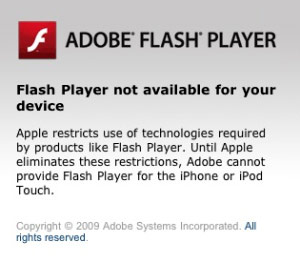Adobe Lashes Out At Apple For iPad's Refusal To Support Flash
Apple's iPhone has never supported Flash, and existing owners are none too happy about it. The only reason Apple gets a pass is that Mobile Safari is so stellar otherwise. In almost every non-Flash scenario, Mobile Safari beats out any other mobile web browser. But the iPad won't get that same pass. The iPad is tailor made to watch multimedia, particularly video. Does Apple really expect to excite people when all the iPad can do is watch YouTube HD clips? Doubtful.
Adobe has taken the necessary step of putting out a blog post scolding Apple for their refusal to adopt to one of the web's most critical technologies, and frankly, we couldn't agree more with their stance. Even in Jobs' demo of surfing the New York Times webpage, onlookers spotted a "No Flash Plug-in Installed" error logo. Embarrassing. It's really amazing that Apple refuses to bring Flash support to the iPad, particularly since that A4 CPU has so much power that is going unused.
Here's the exact statement from Adobe, and yes, it's a doozy.

It looks like Apple is continuing to impose restrictions on their devices that limit both content publishers and consumers. Unlike many other ebook readers using the ePub file format, consumers will not be able to access ePub content with Apple's DRM technology on devices made by other manufacturers. And without Flash support, iPad users will not be able to access the full range of web content, including over 70% of games and 75% of video on the web.
If I want to use the iPad to connect to Disney, Hulu, Miniclip, Farmville, ESPN, Kongregate, or JibJab -- not to mention the millions of other sites on the web -- I'll be out of luck.
Adobe and more than 50 of our partners in the Open Screen Project are working to enable developers and content publishers to deliver to any device, so that consumers have open access to their favorite interactive media, content, and applications across platform, regardless of the device that people choose to use.

